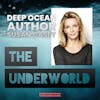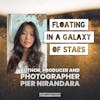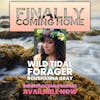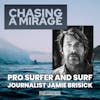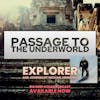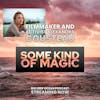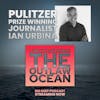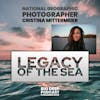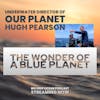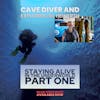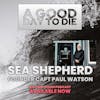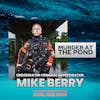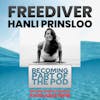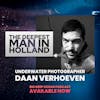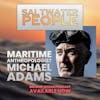Gesture of a Lifetime: Manatee Researcher Jamal Galvez On How Before He Started Saving Manatees They Saved Him

In today's episode I speak with Jamal Galvez, program director at Clearwater Marine Aquarium Research Institute and National Geographic Explorer and Edge Fellow.
Jamal's work focuses particularly on the Antillean manatee of his native Belize. Jamal's passion for marine wildlife runs deep and, in particular, his connection to manatees reaches back to when he was a kid, growing up in the rough, impoverished neighborhoods of coastal Belize.
We spoke from his home in Belmopan, the capital of Belize, and Jamal spoke about how a chance encounter with a research vessel started his interest in marine conservation, how that led directly to his work at the incredible Clearwater Marine Aquarium Research Institute in Belmopan, and how his first interaction with manatees shaped the course of the rest of his life.
Jason Elias:
Hi and welcome to the Big Deep podcast. Big Deep is a podcast about people who have a connection to the ocean, people for whom that connection is so strong it defines some aspect of their life. Over the course of this series we'll talk to all sorts of people and in each episode we'll explore the deeper meaning of that connection. Today I speak with a conservation biologist from Belize whose life was shaped by growing up with the gentle manatees of the Caribbean coast. Hello, this is your host, jason Elias. Welcome to the Big Deep podcast. In today's episode I speak with Jamal Galvez, program director at Clearwater Marine Aquarium Research Institute and National Geographic Explorer and Edge Fellow. Jamal's work focuses particularly on the Antelian manatees of his native Belize. Jamal's passion for marine wildlife runs deep and, in particular, his connection to manatees reaches back to when he was a kid, growing up in the rough, impoverished neighborhoods of coastal Belize. We spoke from his home in Belmapan, the capital of Belize, and Jamal spoke about how a chance encounter with a research vessel started his interest in marine conservation, how that led directly to his work at the incredible Clearwater Marine Aquarium Research Institute in Belmapan and how his first interaction with manatees shaped the course of the rest of his life.
Jamal Galves
My name is Jamal Galves, I am in Belize and I am the program coordinator for the Clearwater Marine Aquarium Research Institute here in Belize, where I oversee the manatee conservation initiatives and other marine species.
Speaker 1:
So can you talk a little bit about what life was like growing up in Belize, and can you tell me when you first remember having a connection to the ocean?
Speaker 2:
I grew up in a very small village outside of Belize City. It's called Gil Spite, manatee. So my connection to water has been for my entire life. It's a part of our culture, it's a part of our heritage, it's a part of our way of life, it's where we get our food from. From a very young age, learning to fish, being out there, learning all the species of fishes, seeing manatees, seeing birds and my grandparents put out, discipline us for going swimming without the permission, so we would try to hide in different places to get in the water and come back, dry our skins off and act as if we were in swimming. And so, for me, I spent most of my childhood days on the water, more than I actually spent on land.
Speaker 1:
So you had a relationship with the water from a young age, but you eventually developed a deeper connection to the native Antelian manatees of Belize from a chance encounter. Can you tell us the path of how that happened and what it has meant to you since then?
Speaker 2:
Well, as a kid I saw this weird looking book drive by has a manatee research written on it. I started asking questions. Like a kid who sees a cool chalk. You're fascinated by the chalk, but for me, growing up around the ocean, it was a board. So I started asking questions and eventually I got answers that these guys were doing when I'm doing research in my community. And before I knew it, my cousins and I started to play when Antelians came out of my grandma's lawn and fight the sea and get to grab the cool board. But my interest eventually grew my grandma's lawn so I strove along to the dock and approached Dr James Wadipo, who's actually my boss still today. I'm 11 years old, small little skinny kitty, I want to come over to you guys. And he looked at me and shook for a second and really that's where my life changed completely. I got on the boat with a manatee and being out there with these world-renowned scientists, learning about these species, hearing that manatees are endangered and during those younger days I didn't even know what the word endangered meant when it was explained to me and to understand that these animals are in trouble and I live right here. Why can't I do something? Particularly when it felt that it was my responsibility to be in, that they're part of our culture, part of our community, part of our waters. To know that something such as like your neighbor that is in trouble and you feel the need to out, I need to do something. You need to step up, speak out. They need to represent them since they are unable to represent themselves, and they need to be a voice for them since they can't speak. And because they can't speak doesn't mean that they don't have something to sing. It really is an honor and a passion for me to be able to be a voice for these species, be able to tell their stories in the smallest areas, the smallest communities, to the largest city across the world.
Speaker 1:
It is incredible sometimes how the most random of moments can have the deepest of impacts on our lives, and it's inspiring to see your passion for these animals, which came out of a research boat simply coming to dock. But there must be something more there for you. And Manatees what does it you find so incredible about Manatees in particular? What is it that moves you personally about these animals?
Speaker 2:
People look at me and say, oh, you're saving one and this, but they don't know the back story to it. Because they saved me first, Manatees saved my life. Growing up in a coastal community, poverty within were exposed to guns, crimes, jobs, violence. It's very difficult for young kids like myself to walk a straight path. You're influenced by your environment, you're influenced by your surroundings and I could have fallen off that path a long time ago. But meeting, interacting and seeing these animals light and feeling the need to want to do something about that teared my road away from guns the great, from violence. People where I grew up, society don't believe that we're meant to be researchers and scientists. It's just not the norm. So where are we writing that norm? I'm hoping that my path will be a dream for the next generation of young boys and young girls that come from where I come, from a group like ILO. For me, the personal connection is a sense of I'm in depth to them for saving my life. So saving their lives is repaying my debt to the species that have kept me alive all these years and do not have fallen short of my destiny, do not have ended up in prison or in jail. People look at it as me saving my land, but it's basically me returning that favor that was given to me some years ago.
Speaker 1:
That is beautifully said, so how does that relate to your work at the Clearwater Marine Aquarium Research Institute? What is it that you and your team are doing there, and why do you find the work there so important?
Speaker 2:
It's not really an aquarium, but more of a marine rescue center. It's more of a marine hospital, and the work that we do is not just rescue, rehabilitate, release animals back to the wild, our home market. Most impactful thing that we had to clear at the Marine Aquarium, though, is inspiration. It really is what's going to change the world. I have a painting on my wall of a huge man, and did a romance in my mission statement, so I don't get complacent Because I'm not trying to save as species, as literally fighting extinction. You cannot afford to get complacent. You cannot afford to get comfortable. I make myself comfortable, being uncomfortable, because working in conservation often feels like you're doing the impossible but you're ungrateful. We gotta do it anyway. No work has led to creating safer space, but these animals have a little bit of space that they can call their home. When we are in our home, we want to feel safe, we want to be comfortable, so they deserve that sense of safety. But till the sea and swim, come to the surface to see a mother and a calf in the rocket's mind blowing. It tells in your heart. Those are some of the greatest feelings of being in this field, that I don't get tired of shiriman and these people. The ocean is a large place that has the biggest heart, so it means that there's so much love in the ocean that we should see and feel it and give that love back by doing the right things. So a job is to light that candle in dark places so that the world can shine and so that the globe can be bright. And there's no payment that you can receive that is greater than the gratitude that you have in your heart for the work that you've done.
Speaker 1:
Well, your passion is inspirational and your dedication is evident. So with that is there one story, one moment of being with manatees you could point to as having some deeper meaning to you.
Speaker 2:
I was 12 years old, going to school in the city, and on weekends I would go back to my village to spend the weekends with my grandma. And there were two one-and-these in the rehab facility in my village, one named Woody and the other one named Hercules. Woody was a young male calf that was found in a place called Buttonwood Bay. Hercules was a young male as well that was very sick to the point where they felt that he may not have recovered it's soul, where it's true to they come strong again. I knew that they were there, so I got on the bus from Belize City, taking it down to Jill's Point where my grandma live, and we were getting late at night. That night I could not sleep because I was so excited about going down there. I couldn't wait until morning to go down to rehabilitation center to help feed and help monitor this young cow. I got up at around 5 o'clock in the morning. It was so dark. My grandma would ask me what are you doing up so early? I'm gonna go help monitor my aunties and feed them and aunties and rehab. I sat there and waited for my friend to come by and he had this three wheel cart that he would carry Boxes of lettuce down to the pen to feed them and aunties. I sat on my grandma's table and waited for him to couple of pass. When he got there he got in the cart and he would write us down to the pen. Most children of the time were interested in going to see my aunties, so I had them all to myself. When he got there, he started feeding the aunties and just feeding the two young cows, just sticking their head up waiting to be fed, being there that entire day, just literally sitting down and just looking at them, monitoring their breaths. It seemed like a simple task for a 12 year old kid. See, not even fun. I don't understand why. For me it was such an enjoyment. Every time that man and they come to the surface, you can hear it and the sense of silence and quietness and the movements so gentle that you can barely even hear the water move. So I'm just a sense of peace. I'm not a quietness, I'm not that. I felt that I exist in the world, just me and those two hunters in this space. I felt that I was in a space that I've never been before at that moment. Later the day we had to separate the two males because we were preparing them for health assessment the day after and this required getting in the water. I'd never gotten in the water with a man. I'd never been before. Most people are afraid of him. I was afraid what I ate, one-h-two. I got in the water and immediately I could see the calf coming towards me, a heartless, beating fat. Not sure what this calf is going to do once he gets to me. I'm standing in the water and I can see him coming towards me. My mind's racing, my thoughts are flying through my head, my heart's beating very fast, but still I stood there and as the calf approached me, I felt that everything stopped. My heart stopped beating, my stomach really didn't even move and the calf literally put his slippers around me, as if I'm giving you a hug. I stood for a second, fascinated, and I wonder how could they find it within themselves? I still love us humans when we're the reason that they were there. He's going to express that magnitude of love to me. Why can't I just love them back? And up to this day of my life is five words unspoken. I'm grateful for you. That's the message I got from that calf that day and it's the message that I've carried for my lifetime and it's the message that really keeps me going. They may not be able to say thank you, but that gesture was a gesture of a lifetime and it's a gesture of a thank you for an entire species. Nothing can outdo that moment for me.
Speaker 1:
Finally, we end every interview and every episode with a single open-ended question. We ask everyone we talk to what does the ocean mean?
Speaker 2:
to you. What does the ocean mean to me? There's not one meaning to the ocean to me. If you look in the dictionary, that's where you'll find that meaning of an ocean. But the definition in the dictionary doesn't resonate with me. There's no way I can put in just words what the ocean means to me. But if I was still, I would say to me the ocean means life, not just my life, but the insurmountable amount of lives that are within the ocean. The ocean is constantly given love. Every wave that you hear, every wave, a surfer surfers on. Every wind that blows in the sea comes from the ocean. It's the greatest reservoir of life on this planet. What the ocean means to me is not what I can take from the ocean, what I can give to the ocean, because the ocean has given to us things that we would not be able to give to ourselves.
Speaker 1:
Thanks for listening to the Big Deep podcast. Next time on Big Deep.
Speaker 2:
But for me, I think the ocean is the feeling of longing, of the beauty, of the transience of the world. It never lasts forever, it's always transient, it's ever changing and, ultimately, we always have to leave.
Speaker 1:
We really appreciate you being on this journey into the Big Deep as we explore an ocean of stories. If you like what we're doing, please make sure to subscribe wherever you listen to podcasts. Also, please find us on the socials where you can like and comment, because those subscribes, likes and comments really make a difference. For more content from our interviews in our series, photos of every guest or just to get in touch, please reach out at our website, bigdeepcom Plus. If you know someone you think we should talk to, please let us know at our Big Deep website, as we are always looking to hear more stories from interesting people who are deeply connected to our world's oceans. Thanks again for joining us.
Featured Episodes
Highlight episodes from our incredible ocean guests.























